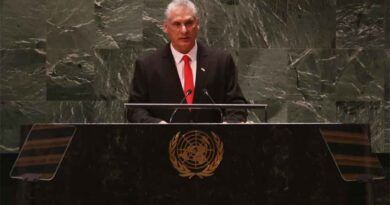Academic Sector, Another Target of U.S. Policy against Cuba
 Havana, Jun 18 .- Washington's hostile policy on Cuba has targeted the academic sector, a stance that has been rejected in the United States and abroad.
Havana, Jun 18 .- Washington's hostile policy on Cuba has targeted the academic sector, a stance that has been rejected in the United States and abroad.
Although the economic, commercial and financial blockade has marked relations between the two countries for over half a century, the impact of aggressiveness by 11 successive U.S. administrations has reached other fields, such as knowledge and research.
For Cuban university professors, the latest example of that hostility took place at the 30th Congress of the Latin American Studies Association (LASA), held from May 23 to 26 in San Francisco, California.
U.S. authorities denied visas to a score of Cuban academics who had been invited to participate in that forum, aimed at debating regional matters, including Cuba.
It was a regular attitude by the White House, which even forced the organizers of LASA meetings to hold their congresses outside U.S. territory, so the three previous events took place in Canada and Brazil.
The visa denials marked the recent event, because practically, all panels at the meeting discussed the issue, and rejection of that decision was the common denominator among participants, the deputy rector of the University of Havana, Cristina Diaz, who attended the event in San Francisco, told Prensa Latina.
According to the researchers, the chairs reserved for those whose visas were denied remained empty with their names, as a clear sign of solidarity, at a meeting that was attended by nearly 5,000 delegates from several continents.
The absence of Cuban scholars and experts in relations with the United States, including Carlos Alzugaray, Soraya Castro, Esteban Morales, Milagros Martinez and Carlos Oliva, just to mention some, was outrageous, she said in Havana.
According to Diaz, Washington's refusal to grant visas to the Cuban specialists forced organizers to make adjustments and reorganize the sessions, in which Cuban academics presented papers and debated their country's situation, economic changes, society, culture, sports and science with colleagues from the United States and other parts of the world.
The presence of the ten colleagues whose visas were denied would have enriched the discussions, as they have a vast experience, had visited the United States previously and had made contracts with prestigious U.S. universities, Diaz added.
For his part, University Professor Jorge Mario Sanchez, co-president of the Cuba Section at LASA, noted that participants in the meeting approved a resolution on the visa denials.
In practice, they sent a letter to Secretary of State Hillary Clinton to express the dissatisfaction of the Association, founded in 1966, with Washington's decision, he told Prensa Latina.
In the letter, the LASA academics urged Clinton to issue visas for the Cuban experts invited to its forums.
In 2013, Washington will host the next LASA congress, so not much has to be waited to see the White House's response. (Radio Cadena Agramonte)

